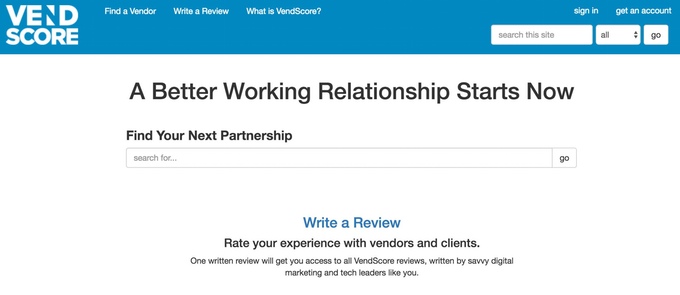Secure your place at the Digiday Media Buying Summit in Nashville, March 2-4
Inside the startup that’s trying to make the vendor-client relationship smoother

The vendor-client relationship is often murky. Vendors complain that agencies and brands often take undue advantage of them by asking them to pay for swag, breakfast sandwiches, or Christmas gifts.
On the agency side, the complaints are that it’s hard to actually vet vendors before signing them. A new project by a bunch of marketing and agency-side employees is hoping to solve the disconnect.
VendScore, an early-stage startup that is hoping to launch in late April, will be a review site that matches clients with qualified vendors via peer reviews. A four-step process will let people rate experiences with vendors and clients and then find the right match. The team behind VendScore is still employed at places both on client and agency-side, and while their bosses are supportive, they’re not exactly thrilled, the founders told Digiday.
Beth Allison, one of the people behind the project, who is an agency person with experience at a variety of shops including SapientNitro, said that the company did a bunch of research before launching and found that each side of the relationship is using a different method to find the right partner.
Clients tend to rely on word of mouth — or email solicitation, which is often spammy, cumbersome and sometimes just a scam. Last year, Digiday reported that vendor emails are one of the biggest pet-peeves at agencies, especially when you hear from vendors more often than your spouses.
(A recent eMarketer survey found that 95 percent of B2B decision makers trust peers and colleagues, but don’t have a place to find peer reviews.) Agencies rely on books of former partners they’ve worked with; but small agencies are often at a disadvantage because they just don’t have the robust production books others have.
Often, holding company relationships will dictate vendor partners too. Vendors rely on forums like SellerCrowd or word of mouth, which often don’t have the necessary information they need in order to know how much to budget for clients. “Some clients may need some hand-holding, some may be at a different stage, and vendors need to know,” said Allison. “Our goal is to make an even playing field,” said Allison.
More in Marketing

Pitch deck: Why Amazon believes its premium streaming inventory is worth the money
Amazon is pitching its DSP to make the case.

In Graphic Detail: The state of the marketing agency sector
Revenue figures from Omnicom, Publicis and Havas, and new employment stats, offer a snapshot on a quickly evolving industry.

Future of Marketing Briefing: The mental gymnastics of principal media
Welcome to the psychological CrossFit class of modern marketing. Here’s how marketers are learning to move through it.





